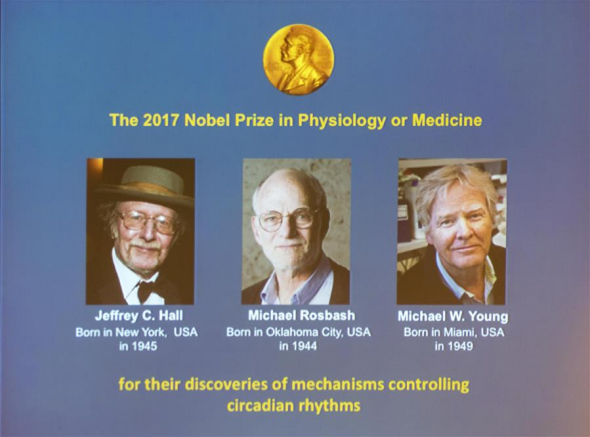
Photos of the three awarded scientists are seen at a press conference in Stockholm, Sweden, Oct. 2, 2017. Three scientists share 2017 Nobel Prize in Physiology or Medicine, the Nobel Committee announced on Monday in Stockholm. The Nobel assembly at the Karolinska Institute has decided to award the 2017 physiology or medicine prize jointly to Jeffrey C. Hall, Michael Rosbash and Michael W. Young for their discoveries of molecular mechanisms controlling the circadian rhythm. (Xinhua/Shi Tiansheng)
Three scientists share 2017 Nobel Prize in Physiology or Medicine, the Nobel Committee announced on Monday in Stockholm.
The Nobel assembly at the Karolinska Institute has decided to award the 2017 physiology or medicine prize jointly to Jeffrey C. Hall, Michael Rosbash and Michael W. Young for their discoveries of molecular mechanisms controlling the circadian rhythm.
For many years, people have known that living organisms, including humans, have an internal, biological clock that helps them anticipate and adapt to the regular rhythm of the day, without knowing how this clock actually work.
"Jeffrey C. Hall, Michael Rosbash and Michael W. Young were able to peek inside our biological clock and elucidate its inner workings. Their discoveries explain how plants, animals and humans adapt their biological rhythm so that it is synchronized with the Earth's revolutions," said a statement released by The Nobel Assembly at Karolinska Institutet.
Using fruit flies as a model organism, this year's Nobel laureates isolated a gene that controls the normal daily biological rhythm.
They showed that this gene encodes a protein that accumulates in the cell during the night, and is then degraded during the day. Subsequently, they identified additional protein components of this machinery, exposing the mechanism governing the self-sustaining clockwork inside the cell.
"We now recognize that biological clocks function by the same principles in cells of other multicellular organisms, including humans," according to the statement.
Since the seminal discoveries by the three laureates, circadian biology has developed into a vast and highly dynamic research field, with implications for our health and wellbeing, the statement said.
The paradigm-shifting discoveries by the laureates established key mechanistic principles for the biological clock. During the following years other molecular components of the clockwork mechanism were elucidated, explaining its stability and function, it said.
"With exquisite precision, our inner clock adapts our physiology to the dramatically different phases of the day. The clock regulates critical functions such as behavior, hormone levels, sleep, body temperature and metabolism."
"Our wellbeing is affected when there is a temporary mismatch between our external environment and this internal biological clock, for example when we travel across several time zones and experience "jet lag", it said.
There are also indications that chronic misalignment between people's lifestyle and the rhythm dictated by inner timekeeper is associated with increased risk for various diseases, it said.
Juleen Zierath, member of the committee, told Xinhua at the press conference that in light of this year's scientific discoveries, for people living in the Nordic environment and exposed to long daylights and darkness, people need to raise awareness of the importance to keep good sleep in due time, even when the sun is still shining.
Jeffrey C. Hall, born 1945 in New York, became associated with University of Maine in 2002. Michael Rosbash, born in 1944 in Kansas City, has been on faculty at Brandeis University in Waltham since 1974. Michael W. Young, born in 1949 in Miami, has been on faculty at the Rockefeller University in New York from 1978.
This year's prize is 9 million SEK. (1.1 million U.S. dollars).


















































